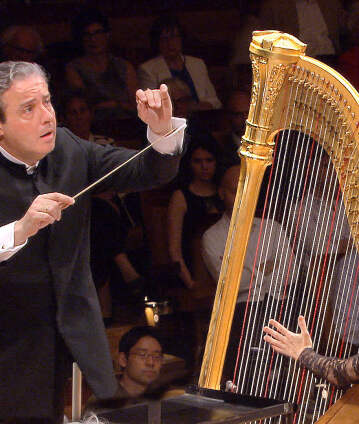Juanjo Mena makes his debut with the Berliner Philharmoniker

Juanjo Mena brought a Spanish and Latin American programme along for his debut with the Berliner Philharmoniker. While Claude Debussy in Ibéria conveys a dreamy summer image of Spain, Manuel de Falla’s ballet music The Three-Cornered Hat vibrates with Mediterranean energy. And then there’s the Argentinian Alberto Ginastera, whose harp concerto combines southern folklore with new sounds in an appealing way.
The music of this programme could be described as folk-influenced without being folkloristic. The three works show how the traditional music of a country can serve as a source of inspiration and be happily integrated into the personal style of the respective composer. In the early 20th century the music of Spain exerted a great fascination on France’s composers, including Claude Debussy. In the second part of his three-part orchestral work Iberia he describes an imagined Spain, conjuring up associations with balmy Mediterranean summer nights and exuberant fairs.
The Spanish composer Manuel de Falla, on the other hand, trained in composition with France’s musical avant-garde, and this played a significant role in developing his own musical language. This is proven by his ballet El sombrero de tres picos (The Three-Cornered Hat), in which the composer makes use of typical Spanish dance forms like the fandango and the seguidilla, while at the same time, however, orienting himself stylistically towards French models in his orchestral colours. The brilliant and rousing piece helped de Falla achieve his international breakthrough.
The music of the Argentinian Alberto Ginastera is also characterized by a successful combination of rhythms and melodies of Latin America and avant-garde compositional techniques. During his studies in the USA, the composer was commissioned to write a harp concerto by Edna Philips, the harpist of the Philadelphia Orchestra. At this concert it is interpreted by Marie-Pierre Langlamet, harpist with the Berliner Philharmoniker. The Spaniard Juanjo Mena conducts, giving his debut with the Berliner Philharmoniker. He was a student of Sergiu Celibidache and currently heads up the BBC Philharmonic in Manchester. Raquel Lojendio, who sings the soprano part in El sombrero de tres picos, also appears in Philharmoniker concerts for the first time.
© 2016 Berlin Phil Media GmbH
Related interviews
Artists
Our recommendations
- Christian Thielemann conducts a concert “à la française”
- The Berlin Phil Series: Vive la France!
- Philharmonic chamber music: “Rêverie française”
- Simon Rattle conducts Beethoven’s “Pastoral” Symphony and Modernist concertos
- Brahms’s Requiem with Donald Runnicles and the Atlanta Symphony Chorus
- French musical magic with Juanjo Mena